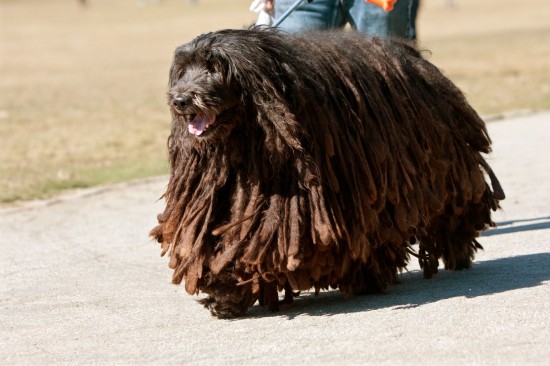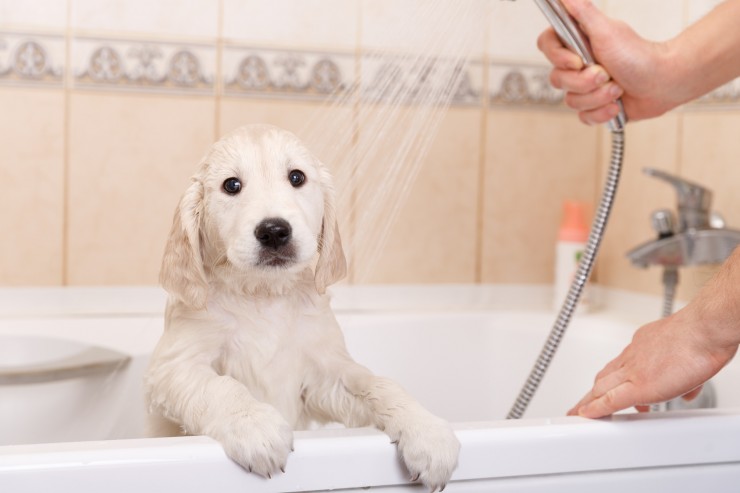
When a dog begs, whether its at the dinner table or when folks are snacking around the super-bowl, it can be very annoying not only to you but to your guests also. If you step back and take a look at what leads to begging it is quite simple. Begging starts when someone offers a dog a taste of “people food”.
The number one rule is; DO NOT reward the behavior. This is easiest to begin if you are starting with a new puppy, but you can do things with older, more established dogs. Basically if you offer a dog a taste of whatever it is that you are eating while it is staring with those sad eyes, it will become an addiction that is very difficult to break. I realize that it is very tough to not give your best friend something that you find scrumptious. After all, this is your most loyal companion. (Don’t tell your spouse this, rule number 2)
Coupled with the number one rule is; DO NOT give your dog “people food”. If you follow this advice alone it will avoid the problem from developing in the first place. You must also not resort to dipping into the dog treat bag to reward a begging behavior. This will create the addiction just as well as people food will. Following guidelines such as this will lead to a inherent type of “lifestyle” dog training that will make things much easier for you and your dog.
Another good reason to avoid people food is that you will not risk giving your dog something that is potentially toxic which can lead to complications or death. A few examples of foods that are dangerous to dogs are: garlic, onions, pork, chocolate, grapes, raisins, heavily salted foods and walnuts. Chocolate can be the most dangerous depending upon how much is ingested per the size of the dog. It is not the chocolate itself that can produce problems, but Theobromine. Theobromine is an alkaloid compound that is harmless to humans but can be deadly to dogs. It is known to cause seizures and cardiac arrythmia in high enough concentrations.
Also avoid chicken, turkey or beef fat, since large amounts of these can bring on acute pancreatitis in your dog. It is a miserable illness to witness, and I have seen it cut the life short of a wonderful schnauzer at ten years old. (It raided the garbage can of chicken fat) Check out the book referenced in the previous paragraph for what to do in such occurrences.
The commercial dog foods that I prefer are Hill’s Science Diet. They have a wonderful range of “stage of life” foods for dogs (puppy, adult, senior) as well as foods geared toward specific lifestyles. (Sensitive stomach, Arthritic, Dental Formulas, etc…) The Science Diet foods tend to be less “moist” and seem much better to me and all dogs I’ve experienced seem to love it. I use the dental treats when I do choose to engage in reward training.
If your dog already has the begging response engrained within it, you can still break the habit but it will take some time and patience. If your dog is a chronic beggar, do not let it near the dinner table when you and/ or your family are having meals. You can try giving your dog it’s food while you are eating (feed it in a different room), but this will require you synchronize your dog’s meal schedule(s) with yours.
Keep your dog in a separate area from your dining area for several weeks and gradually try letting the dog roam free as you eat your meals. If the begging behavior re-0ccurs, simple say NO! sternly and gently place the dog back into the separation area. Never hit or be violent with your dog, since this can lead to aggressive behavior. You can also stress “keywords” such as LIE DOWN as you place the dog in it’s separation area. After awhile, your dog will surprisingly start to obey the keyword phrase and retreat to the area in which you’ve trained her to stay while you enjoy your meals.
If you are having parties and prefer that your dog not beg (given it is a beggar) simply practice the same techniques as mentioned above for several weeks and you will start to see behavioral changes. If you are having guests that you suspect may not prefer the companionship of canines, you may wish to keep your dog separated from the engagement altogether, eliminating the problem completely.
In summary, if you are starting fresh with a puppy, you should have no problem with begging if you stick to the number one rule of not rewarding begging behavior/NO people food. If you are dealing with the problem with an established dog, the dog training advice in this article will certainly help as long as you practice patience, understanding and have a stick with it attitude.
Dog Training
http://www.dogsrus-dogtraining.blogspot.com
 How To Keep A Young Bergamascos Coat Looking Good
How To Keep A You
How To Keep A Young Bergamascos Coat Looking Good
How To Keep A You
 Keeping Your Dog Safe On Christmas Day
Keeping Your Dog
Keeping Your Dog Safe On Christmas Day
Keeping Your Dog
 Allergy Shampoos For Dogs - Ingredients To Avoid
Allergy Shampoos
Allergy Shampoos For Dogs - Ingredients To Avoid
Allergy Shampoos
 Fungal Infections Seen In Dogs
Fungal Infections
Fungal Infections Seen In Dogs
Fungal Infections
 Five Universal Personality Traits Of The Ragdoll Cat
Five Universal Pe
Five Universal Personality Traits Of The Ragdoll Cat
Five Universal Pe
Copyright © 2005-2016 Pet Information All Rights Reserved
Contact us: www162date@outlook.com